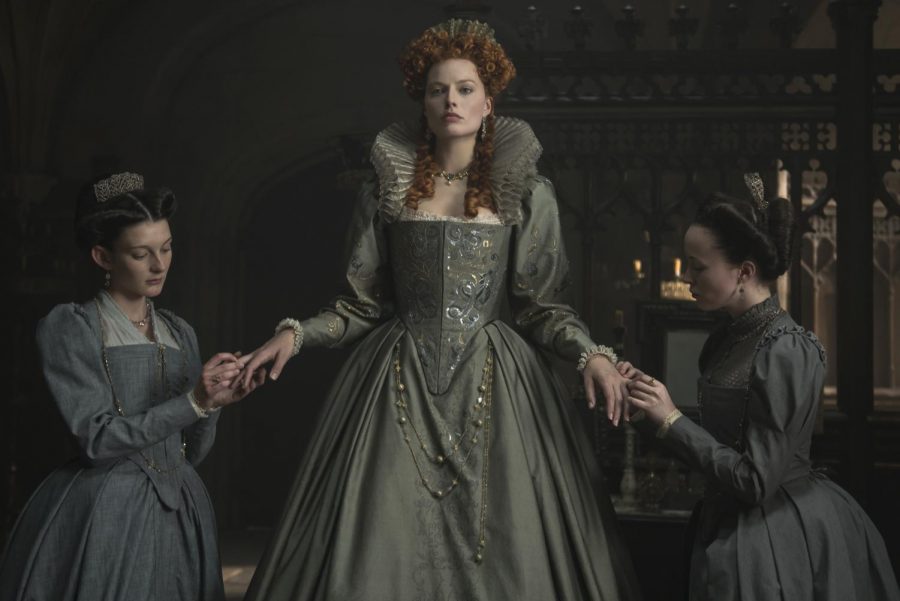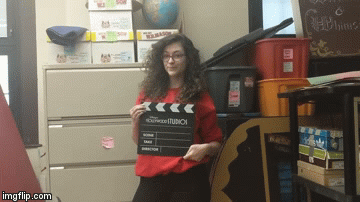Margot Robbie not enough to save Mary Queen of Flops
Photo Credit: Parisa Tag / Focus Features
Mary Queen of Scots will be released in the UK on January 18. The film was released on December 7, 2018 in the US, grossing only around $11 million, less than half of the $25 million budget.
January 4, 2019
Oscar-bait Mary Queen of Scots aims to be a powerful feminist statement, but it’s pomposity and lack of regard to historical accuracy squashes any attempts to derive a meaningful message from it.
First time director Josie Rourke depicts the tumultuous relationship between Mary Stuart (Saoirse Ronan) and Elizabeth I (Margot Robbie) in this historical fact-based film. Stuart attempts to reclaim her rightful Scottish throne, but Elizabeth is already in control of both England and Scotland. Not only does their relationship hang in the balances, but so does the fate of Great Britain.
As compelling as the plot may sound, sitting through Mary Queen of Scots was a royal pain.
The filmmakers did nothing to elevate the story and made it a lackluster play by play of past events. That is something that could have been easily fixed by taking artistic liberties. However, the only times the plot became interesting was when historical facts were manipulated for the sake of dramatization, pushing feminist rhetoric. This technique requires no creativity, (something the film has in common with the equally manipulative 2018 release Bohemian Rhapsody) and tricks the viewers into believing that certain events occurred in history, when they actually didn’t. For example, the climactic scene where Mary and Elizabeth finally meet? Never happened– even though the whole movie was leading up this encounter and was the most interesting and riveting scene in the movie.
The film’s blatant and obnoxious historical inaccuracy also adds another component to this. For example, there was a scene where an (implied) gay man, who was a cohort of Mary’s, was dressing up in drag and dancing around. The women that are standing around him are cheering him on (this takes place in 16th century Europe), something most likely very uncharacteristic of that time period. Not only is this factually inaccurate, but it does nothing to further the plot.
And although Ronan boasted a strong, Oscar-nominated performance in Lady Bird last year, her over-the-top delivery of poorly written lines (“Should you murder me, you murder your Queen!”) discredited her previous accomplishments. Robbie, who was also nominated for an Oscar last year for her role as Tonya Harding in the biopic I, Tonya, outperformed Ronan’s excessive performance. She combated Ronan’s overly intense acting understatedly and subtly, despite the source material she was given. Sadly, she did not get much screen time, something she rightfully deserved (and was definitely needed).
The production design and costumes were also pleasant, but nothing was done to showcase them by the cinematographer. Instead, there were numerous upper-half body shots of Mary riding a horse, which add nothing to the film’s artistic value. The score was also decent, as it brought some moments of liveliness to an otherwise lukewarm plot.
Although, the film’s biggest flaw was its obsession with trying to be a feminist statement piece. Not only did the filmmakers fail at doing this, but they tried so hard to push their agenda that they included flagrant scenes where male characters point out that the “incompetence” of the Queens is solely because they are female. “How did it come to this– wise men servicing the whims of women?” one Lord said.
However, the females are no better. In one scene, Mary wrote to Elizabeth, “But ruling side by side, we must do so in harmony; not through a treaty drafted by men lesser than ourselves.” It’s a constant scene of watching the women pit themselves against the men, and the men pit themselves against the women.
Additionally, the movie tries to preach the “independent female” standpoint, yet throughout the movie, both Queens are seen using and manipulating the men around them for their political or personal benefit.
In the end, women could get more empowerment by sitting at home and scrolling through the #MeToo hashtag on Twitter than putting themselves through this pointless movie.




